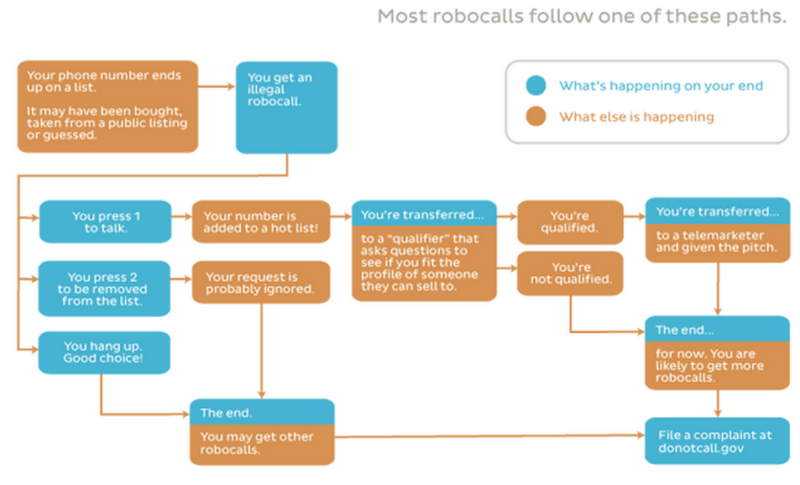Google Files Suit Against SEO Firm Accused Of Robocalling, Launches Complaint Center For Users
The company finally takes defensive action against illegal robocallers that prey on small businesses.

After years of near inaction, Google is stepping up to take on robocallers that claim affiliation with the company in order to prey on small businesses. In addition to launching a new page for users to report call scams, Google filed suit on Wednesday against a search engine optimization firm for making robocalls.
“Our office is beseiged [sic] daily by phone calls asking to update our Google listing. The calls said we could push a number to be removed from their database, but the calls continue even after we did so. How do we get those calls to stop??”. That complaint from 2013 is just one of many that come up in a search for “robocalls” on the Google My Business help forum.
In its first legal move to combat robocallers claiming to work for or with the company, Google My Business Operations Manager Brad Wetherall announced in a blog post that “today we’re filing an action in California against one search engine optimization company for making these robocalls and confusing our users.” The name of the firm had not been released at the time of publication but will be updated here when available.
Update 9/16: Google filed suit in the Northern District of California against Local Lighthouse Corp (site here), based in Tustin, California, which promotes paid search and SEO services. Search Engine Land has received a copy of the filing, it is embedded below.
The suit claims that Local Lighthouse Corp “sales agents have made and continue to make various false and misleading claims during Defendant’s telemarketing calls to confuse consumers regarding the true source or nature of Defendant’s services and the relationship between Google and Defendant” and “exploits such confusion to induce consumers to enter into contracts costing hundreds of dollars in recurring monthly bills.”
As an example, the Google claims Local Lighthouse “sales agents have made statements such as: ‘We’re a Google subcontractor,’ ‘we’re working for Google,’ ‘the $100 fee [to initiate Defendant’s services] goes to Google,’ and Defendant’s customers’ webpages ‘will show up multiple times on the front page and get what’s called ‘Front Page Domination.’”
Local Lighthouse has a least five other civil cases pending against it for violating the Telephone Consumer Protection Act which makes placing robocalls without consent illegal. Two of the cases were filed in California courts, the others were filed in North Carolina, Washington and Oregon.
In tandem with filing legal action, Google also launched a new Safety Center page on Wednesday for users who receive robocalls from companies purporting to be affiliated with the search giant. The page explains steps users should take to protect themselves from further calls and offers links to a report the callers to Google, as well as the FTC (Federal Trade Commission) or FCC (Federal Communications Commission).
Typically, the calls start with a recording that prompts recipients to press a button in order to speak with a representative about claiming or updating their Google My Business Listings or to hear how they should be performing better in Google search or AdWords. The aim may be to sell local search optimization services or to get login information to hijack business listings or spam Maps listings. These types of automated calls are illegal in the United States because the recipients haven’t given written consent to get sales calls from the company doing the calling.
Despite the fact that businesses have been complaining about getting bombarded with robocalls for years, and Google’s own reputation has suffered when recipients believe that Google is involved with the calls, until now, the company has hung back from taking direct action, instead directing users to go to the National Do Not Call Registry or to file complaints with the FCC or FTC.
Perpetrators are hard to go after, Google says, because they often use untraceable phone numbers, fake company names and a global network of intermediaries to execute the calls. The graphic below from the FTC maps what happens during a typical illegal robocall.
Google may call users to verify business listings, maps details, AdWords and other products, but the company says these calls are always from live representatives and never automated, unless specifically requested by the user. The best thing to do if you receive a robocall from any entity (not just Google impersonators) is to immediately hang up. Do not press any button because once you do, they’ve got your number, literally, and you’ll likely just keep getting more illegal calls. The FCC says it received more than 214,000 complaints about unwanted calls in 2014.
Google’s actions Wednesday signal that it will be more active in addressing the robocalls that have been inundating local businesses.
Contributing authors are invited to create content for Search Engine Land and are chosen for their expertise and contribution to the search community. Our contributors work under the oversight of the editorial staff and contributions are checked for quality and relevance to our readers. The opinions they express are their own.
Related stories
New on Search Engine Land
